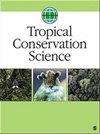The Use and Prescription of Pangolin in Traditional Vietnamese Medicine
IF 1.6
4区 环境科学与生态学
Q2 BIODIVERSITY CONSERVATION
引用次数: 8
Abstract
It is now acknowledged that demand stemming from traditional medicine stimulates a continued market for illegal wildlife trade globally. Increasing demand for pangolin fuels widespread unsustainable extraction and an illicit international trade that is threatening pangolin populations worldwide. Vietnam is an important transit country in this trafficking network and a significant consumer country, particularly due to their longstanding tradition of consuming wildlife products as traditional medicine. We conducted 51 semi-structured, questionnaire-based interviews with traditional Vietnamese medicine practitioners in Hanoi, Vietnam to explore the factors influencing their prescription of pangolin. The results show that traditional Vietnamese medicine practitioners are important drivers of pangolin use and that prescription continues despite prohibitive legislation. The main influencing factors were money, illegality (as a deterrent) and supply. Wealthier patients were more likely to use pangolin as medicine and patients generally trusted a doctor’s prescription. Awareness of regulations related to pangolin use in traditional medicine was low and pangolin use continued without fear of the law. Lactation, abscesses and circulation were the most prescribed uses for pangolin scales. All respondents believed that pangolin can be substituted, however, a belief remained that substitutes are inferior to pangolin. This study provides a unique perspective of pangolin use in one of the main pangolin consumption countries in the world. The results suggest that the law is not being implemented effectively and that increased enforcement efforts are necessary. Furthermore, these insights serve to inform future demand-reduction campaigns whereby the most common uses and substitutes for pangolin scales may be targeted.穿山甲在越南传统医学中的应用及处方
现在人们承认,传统药物的需求刺激了全球非法野生动物贸易的持续市场。对穿山甲的需求不断增加,助长了广泛的不可持续开采和非法国际贸易,威胁着世界各地的穿山甲种群。越南是这一贩运网络中的一个重要过境国,也是一个重要的消费国,特别是因为他们长期以来将野生动物产品作为传统药物消费。我们对越南河内的越南传统医生进行了51次半结构化、问卷调查,以探讨影响他们开具穿山甲处方的因素。结果表明,越南传统医生是穿山甲使用的重要驱动因素,尽管立法禁止,但处方仍在继续。主要影响因素是金钱、非法性(作为威慑)和供应。富裕的患者更有可能使用穿山甲作为药物,患者通常相信医生的处方。人们对传统医学中使用穿山甲相关法规的认识很低,穿山甲的使用仍在继续,而不必担心法律。哺乳、脓肿和循环是穿山甲鳞片最常用的处方。所有受访者都认为穿山甲是可以替代的,但仍然认为替代品不如穿山甲。这项研究为穿山甲在世界上主要消费国之一的使用提供了一个独特的视角。结果表明,该法律没有得到有效实施,有必要加大执法力度。此外,这些见解有助于为未来的减少需求运动提供信息,从而使穿山甲鳞片的最常见用途和替代品成为目标。
本文章由计算机程序翻译,如有差异,请以英文原文为准。
求助全文
约1分钟内获得全文
求助全文
来源期刊

Tropical Conservation Science
BIODIVERSITY CONSERVATION-
CiteScore
3.60
自引率
5.90%
发文量
16
审稿时长
>12 weeks
期刊介绍:
Tropical Conservation Science is a peer-reviewed, open access journal that publishes original research papers and state-of-the-art reviews of broad interest to the field of conservation of tropical forests and of other tropical ecosystems.
 求助内容:
求助内容: 应助结果提醒方式:
应助结果提醒方式:


